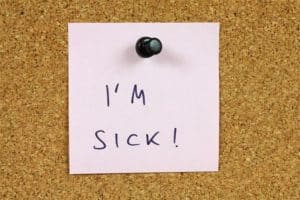
Fun Fact: Connecticut was the first state in the U.S. to pass legislation ensuring that many workers in the state can take paid time off to recover from an illness, to seek medical care or to care for a sick family member. As of late 2016, there are only three other states in the country that have joined with CT by implementing a statewide sick day law – California, Massachusetts and Oregon.
Here are 5 considerations to help determine if you’re too sick to work:
Tip 1: Consider Your Symptoms
A quick assessment of the symptoms that are ailing you can help determine if you should stay home. Fever? If you have one, you’re contagious regardless of other symptoms you might have. If your fever is 100°F or higher, it’s best to stay home and not pass your sickness onto others.
If you have any of these other symptoms, it might be best to stay home (besides, if you’re feeling lousy and you go to work anyway, there’s a good chance you’re not going to be very productive). Think twice about working if you have a persistent cough, vomiting or diarrhea, or a rash that’s associated with a fever or other kind of contagious condition.
Tip 2: Consider Your Occupation
The kind of work you do can also help determine if you’re too sick to work. If you have a physically demanding job, you may want to take time off to rest and not push yourself. If you have a job that requires constant contact with lots of people (health care, school, retail, food services) then keep you and your germs at home.
Tip 3: Consider Your Co-Workers
Your work colleagues could also be a determining factor in whether you stay home or go to work. Certain people are more susceptible of catching a contagious illness. So if you have co-workers who are elderly, pregnant or have small infants at home, it’s wise to stay home and not expose yourself to others.
Tip 4: Consider the Consequences
Sometimes you have to think about the consequences of calling out sick. Maybe your employer doesn’t offer a lot of sick leave. Or maybe taking a sick day means you don’t get paid. Maybe you have a big meeting or presentation you need to plan for. Or maybe vacation is around the corner and you need to wrap up things before heading out. Of course if you’re really sick then it’s best to stay home. But if you just have a small cold or minor illness, then the above circumstances might sway your decision.
Tip 5: Consider Other Work Options
More people these days are working remotely or taking advantage of their employer’s flex time policies. If you have the option of working remotely or making up your hours later in the week, then you can rest easy knowing you can take some time off to recuperate and still put your hours in without losing any sick days or paid time off. Win!
Source: 5 Ways to Help You Decide if You Should Call in Sick
